
The annual WWRF Workshops, in conjuntion with WWRF Huddle 2024, will take place on 16th and 19th April at the BNetzAoffices in Fehrbelliner Platz 3, 10707 Berlin, Germany.
Registration for the workshops is separate from the Huddle, so please head to the relevant workshop link below to register your place.
The idea of this workshops is, based on inputs from working-group leaders and other WWRF members, to discuss, update and develop a vision and strategy for the development of next-generation mobile communications.
The output should be a 6G position statement and research roadmap. This will be updated and completed by the WWRF 6G working group.
During the workshop the chair will give a short summary of existing strategy and position papers from NGMN, 6GIA and other organizations, and then lead a discussion whether and how we as WWRF should have our own position statement on 6G formulated.
To achieve this, all WWRF working group leaders will contribute with a short impulse statement for their area and spell out how they would wish to see it represented in the final position paper. All who would be present of course will be able speak during the workshop, and all can send written statements to be included in the discussion.
This should be a fascinating and productive experience. Discussion topics will include, for instance, business drivers, revolution vs evolution, ubiquitous communications, sustainability, security and privacy, new radio and network technologies, vertical markets, ehealth, connected vehicles, rail networks and many more.
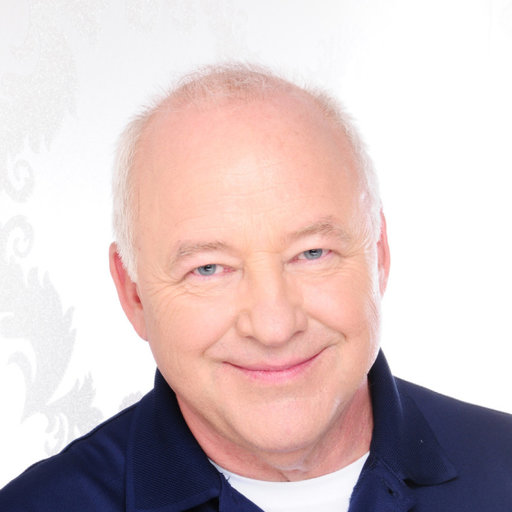
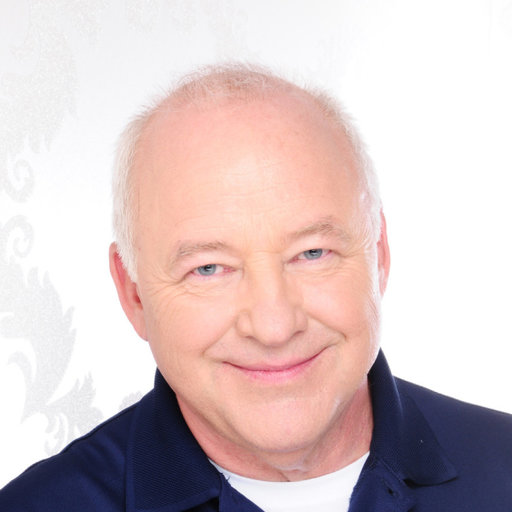 Hendrik Berndt, Vice President for Europe, Middle East, Africa, WWRF
Hendrik Berndt, Vice President for Europe, Middle East, Africa, WWRF Dr. Hendrik Berndt is Vice-president of the Wireless World Research Forum for Europe, Middle East and Africa. He dedicates himself to positions as Senior Advisor to partners in Asia, the Americas and Europe to contribute to solutions for the bigger global societal ICT challenges. Berndt is advisor to the Association of Radio Industries and Businesses (ARIB) Japan.
He has been continuously appointed to support the European Commission for establishing next generation mobile communication system research directions, currently with focus on Beyond 5G. Since 2015 Berndt serves as board member of the IEEE ComSoc Industry Communities Board, vice chairing its Special Interest group for 5thG. Additionally, he holds the position as Senior Consultant for the chair of Communications Technology (ComTec) at the University Kassel.
Berndt is founder of the 2015 established International Institute for Innovation Aysén–Patagonia. From 2001 until 2014 Berndt held the position as CTO and CSO of DOCOMO’s Communications Laboratories Europe, in Munich, Germany. From 2000 to 2010 he has been teaching con-currently as Visiting Professor at the Global Information and Telecommunication Institute, Waseda University, Tokyo, Japan. Berndt was stationed in the US from 1993 until 2000. During these years he worked within Bellcore, Red Bank, NJ; as Executive Director of Advanced Technology for Global One in Reston, Virginia; as invited member of Sprint’s Office of Network and Architecture Planning in Kansas and held the position as Chief Technology Officer of the TINA-C headquarters in New Jersey, USA. His recent publications are directed towards 6G.
Hendrik Berndt
Vice President for Europe, Middle East, Africa, WWRF
AGENDA:
1. “Next-Gen Rural Healthcare: Teleoncology integrated with Colorectal Network for Semantic Segmentation of Colorectal Cancer” – Dr. Rizwan Ali Naqvi, Assistant Professor, Department of Artificial Intelligence and Robotics, Sejong University, South Korea
2. “Community-Oriented Wearable Computing Systems” – Muhammad Azfar Yaqub, PhD, Free University of Bozen-Bolzano, Italy
3. “Therapy Reloaded – Game Changer for Rehabilitation” – Gordon Johnson, Head of Software Development, Ubitech Limited, London, UK
4. “Leveraging AI in 6G networks for remote healthcare outreach” – Dr Shuja S Ansari, Lecturer – Autonomous Systems and Connectivity, Impact Lead – PGR and Postdoc Engagement, James Watt School of Engineering, The University of Glasgow
5. “Retinal Vasculometric Analysis for Disease Prediction” – Prof. Dr. Sarah Barman, Professor in Computer Vision, Faculty of Engineering, Computing and the Environment, Kingston University, London, UK
6. “Exploring the Next Frontier: Digital Healthcare Innovations in the Era of 6G Technology” – Dr Rehan Usman, Senior Lecturer, Faculty of Engineering, Computing & the Environment Kingston University, London, UK
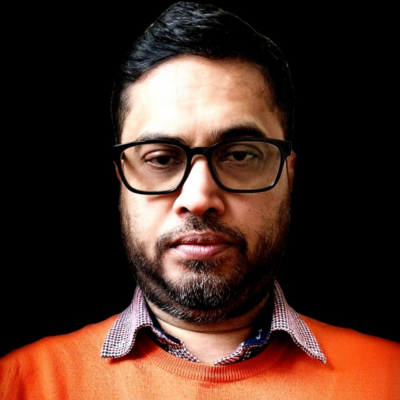
 Dr. Nuwan Weerasinghe, CEO, SIMULTELCO LTD, London, UK
Dr. Nuwan Weerasinghe, CEO, SIMULTELCO LTD, London, UK He earned his B.Sc. in Electrical and Information Engineering from the University of Ruhuna, Sri Lanka, and a Ph.D. from Kingston University, London, focusing on “Security and Reliability for Future Multi-Hop Wireless Networks.”
As an entrepreneur, Dr. Weerasinghe founded several tech ventures, He currently leads SIMULTELCO as the Founder and CEO. The company leads in creating cutting-edge, cloud-based simulator for 6G technology. He also applies his knowledge as a Consultant for the World Health Organization in Europe, driving AI research and cloud system management, and as a Visiting Lecturer at Kingston University’s Faculty of Engineering, Computing, and the Environment.
Since 2020, Dr. Weerasinghe has been an integral member of the WWRF Independent Evaluation Group, assessing IMT-2020 technologies. With a deep-rooted interest in network optimization and security for 5G and beyond, alongside application development leveraging AI and ML-based cloud technologies, Dr. Weerasinghe has made substantial academic contributions. He has shared his insights and findings through numerous publications in esteemed journals, book chapters, and conferences.
Dr. Nuwan Weerasinghe
CEO, SIMULTELCO LTD, London, UK
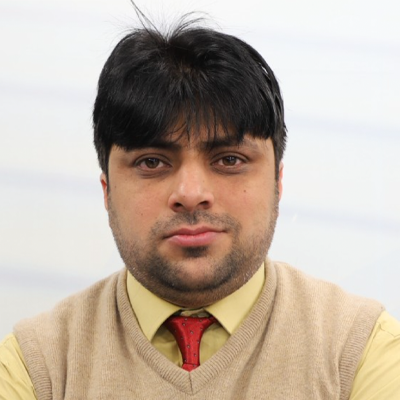
 Dr. Rizwan Ali Naqvi, Assistant Professor, Department of Artificial Intelligence and Robotics Sejong University, South Kore
Dr. Rizwan Ali Naqvi, Assistant Professor, Department of Artificial Intelligence and Robotics Sejong University, South Kore Rizwan Ali Naqvi holds a B.S. degree in computer engineering from COMSATS University, Pakistan (2008), an M.S. degree in electrical engineering from Karlstad University, Sweden (2011), and a Ph.D. in electronics and electrical engineering from Dongguk University, South Korea (2018). He has held positions as Lecturer at Sharif College of Engineering and Technology, Pakistan, and Senior Lecturer at The Superior College, Pakistan. Following his Ph.D., he served as a Postdoctoral Researcher at Gachon University, South Korea, and is currently an Assistant Professor at Sejong University, South Korea. His research interests span gaze tracking, biometrics, computer vision, artificial intelligence, machine learning, deep learning, and medical imaging analysis.
Dr. Rizwan Ali Naqvi
Assistant Professor, Department of Artificial Intelligence and Robotics, Sejong University, South Korea
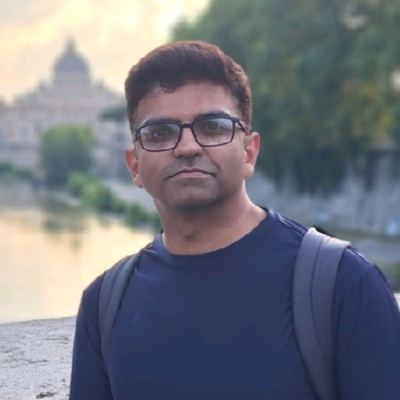
 Muhammad Azfar Yaqub, PhD, Faculty of Engineering Free University of Bozen-Bolzano Bolzano BZ, Italy
Muhammad Azfar Yaqub, PhD, Faculty of Engineering Free University of Bozen-Bolzano Bolzano BZ, Italy Muhammad Azfar Yaqub is an Assistant Professor at the Faculty of Engineering, Free University of Bolzano Italy, where he teaches Mobile software development and Foundations of Programming. Previously, he was an Assistant Professor at the Department of Electrical and Computer Engineering, COMSATS University Islamabad (CUI), Pakistan. Azfar’s research interests is focused on future internet architectures, connected vehicles, intelligent systems and networks. He is an active IEEE and ACM member serving TPC/reviewer for several conferences and journals.
Muhammad Azfar Yaqub, PhD
Faculty of Engineering, Free University of Bozen-Bolzano, Bolzano BZ, Italy
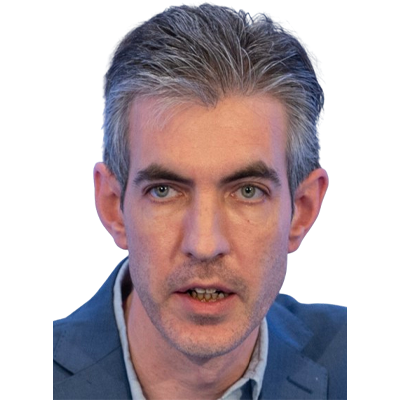
 Gordon Johnson, Head of Software Development, Ubitech Limited, London, UK
Gordon Johnson, Head of Software Development, Ubitech Limited, London, UK Gordon Johnson boasts a dynamic career as the Head of Software Development and Co-Director at Ubitech Ltd, where his influential leadership has flourished over the past six years. Throughout his tenure, Gordon has played a pivotal role in spearheading the development of several notable projects, including the groundbreaking Gable project funded by the EU Horizon 2020 initiative, the innovative UbiTheraPlay project supported by GCRF, and the acclaimed Therapy Reloaded platform.
In addition to his impactful contributions to software development, Gordon is a dedicated scholar pursuing a Ph.D. in Artificial Intelligence. His research focuses on leveraging Deep Learning techniques for Assistive Facial Expression Recognition tailored to individuals with Autism. This pioneering work reflects Gordon’s commitment to harnessing technology for social good and enhancing the lives of those with unique needs.
Moreover, Gordon holds the esteemed position of Postdoctoral Research Associate at Kingston University, where he engages in cutting-edge research on the analysis of retinal images. His work involves the application of advanced Deep Learning approaches to perform image registration of retinal vessels within longitudinal datasets. This interdisciplinary endeavor underscores Gordon’s versatility and his ability to apply his expertise across diverse domains.
Gordon’s academic journey is marked by excellence, having earned a First Class BSc in Computer Science and an MSc with Distinction in Game Development (Programming). His academic achievements, coupled with his impactful research and leadership in software development, position him as a prominent figure at the forefront of technological innovation and scientific inquiry.
Gordon Johnson
Head of Software Development, Ubitech Limited, London, UK
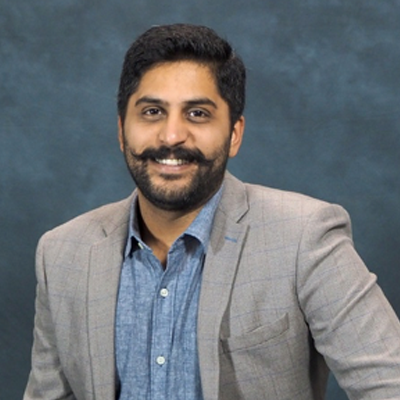
 Dr Shuja S Ansari, Lecturer - Autonomous Systems and Connectivity Impact Lead - PGR and Postdoc Engagement James Watt School of Engineering, The University of Glasgow
Dr Shuja S Ansari, Lecturer - Autonomous Systems and Connectivity Impact Lead - PGR and Postdoc Engagement James Watt School of Engineering, The University of Glasgow He is currently a Lecturer in the Autonomous Systems and Connectivity with the James Watt School of Engineering at the University of Glasgow (UofG) and Wave-1 Urban 5G use case implementation lead at Glasgow 5G Testbed (G5G) funded by the Scotland 5G Centre. He is also the Co-Principal Investigator from Glasgow on the UK Electromagnetic Environment Hub (EME Hub) funded by Dstl. Dr Ansari also manages the Open RAN (Radio Access Network) portfolio of Department of Science and Innovation Technology (UK Government) funded projects at the University of Glasgow (worth over £15m). He is also the deputy director of impact, leading the PGR and Postdoc engagement at the School of Engineering.
Dr Ansari has previously worked in the telecom operator industry in the radio planning and optimisation department as well as network operations centre. Dr Ansari is a Chartered Engineer and has been endorsed by the Royal Academy of Engineering as a promising leader in the field of telecommunications and artificial intelligence.
Dr Shuja S Ansari
Lecturer – Autonomous Systems and Connectivity, Impact Lead – PGR and Postdoc Engagement, James Watt School of Engineering, The University of Glasgow
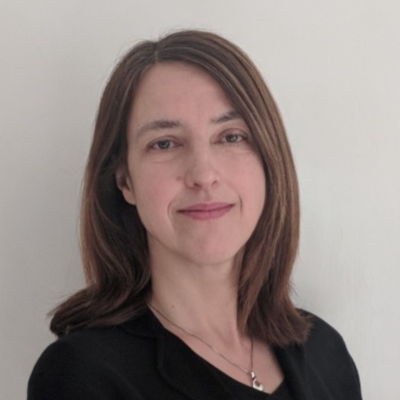
 Prof. Dr. Sarah Barman, Professor in Computer Vision, Faculty of Engineering, Computing and the Environment, Kingston University, London, UK
Prof. Dr. Sarah Barman, Professor in Computer Vision, Faculty of Engineering, Computing and the Environment, Kingston University, London, UK Prof. Dr. Sarah Barman
Professor in Computer Vision, Faculty of Engineering, Computing and the Environment, Kingston University London, UK
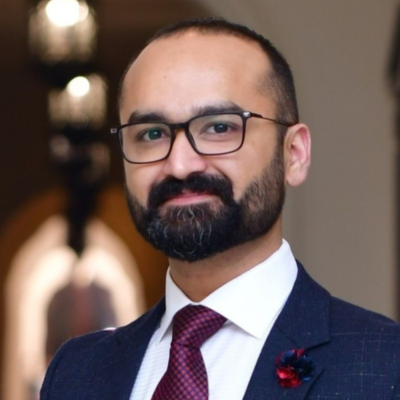
 Dr Rehan Usman Senior Lecturer, Faculty of Engineering, Computing & the Environment, Kingston University, London, UK
Dr Rehan Usman Senior Lecturer, Faculty of Engineering, Computing & the Environment, Kingston University, London, UK M. Rehan Usman was born in 1986. He received the B.S. degree in electrical engineering from the COMSATS Institute of Information Technology, Lahore, Pakistan, in 2008, and holds the dual M.S. degree; the first M.S. degree in electrical engineering with specialization in telecommunications from BTH, Sweden, in 2010, the second M.S. degree in project management and operational development from KTH, Sweden, in 2013, and the Ph.D. degree in IT convergence engineering from the Kumoh National Institute of Technology (KIT),
South Korea, in 2018.
He is currently a Senior Lecturer/an Associate Professor with the Faculty of Engineering, Computing and the Environment, Kingston University, London, U.K. Moreover, he is chairing the Digital Healthcare Vertical Industries Platform (VIP) Working Group in Wireless World Research Forum (WWRF). His research interests include 6G and beyond HetNets, mIoT, cyber security, AI applications in healthcare and smart cities and quality of experience (QoE).
Dr Rehan Usman
Senior Lecturer, Faculty of Engineering, Computing & the Environment Kingston University, London, UK
6G research in industry and academia has revolved around identifying critical scenarios for connectivity and inventing powerful and cost/power efficient enablers to address the corresponding challenges. There seems to be an agreement among the various stakeholders that critical usage scenarios will include a group of extreme evolution of the well-known 5G usage scenarios (MBB, URLLC, MMTC) and a group of revolutionary usage scenarios with a clear emphasis on ‘beyond communications’ objectives. Reliable, resilient, and tactile connectivity ‘beyond the transmission of bits’ will require the integration of breakthrough technologies that combine the merits of intelligent and immersive connectivity with situational awareness, localization, environmental mapping, multi-functional communications and sensing and the ability to tune/reconfigure the wireless environment on the fly. Advanced sensing technologies, intelligent material science and cyber-physical intelligence are expected to play a significant role.
Integrated Sensing and Communication (ISAC) is expected to be a key driver of 6G, where one system would share the same resources in time, space and frequency while running on the same hardware. ISAC is envisaged such that the network behaves as a “radar” sensor and makes use of its own radio waves to understand its own physical environment. This is accomplished by a network measuring such physical parameters like distance, orientation, velocity, shape, size, etc. Sensing by the network can help to improve its own functions and operations and improve upon the services of AR, digital twinning, 3D imaging, etc. Signal processing plays a central role in joint sensing and communication systems to utilize spectrum resources more efficiently and to reduce hardware costs. 3GPP and ETSI have already begun to look into the ISAC requirements for inclusion in 3GPP Releases beyond Release 19.
This workshop is organized to cover a broad range of use cases, architectures, technologies and requirements to realize the vision of integrated sensing and communication in future communication networks.
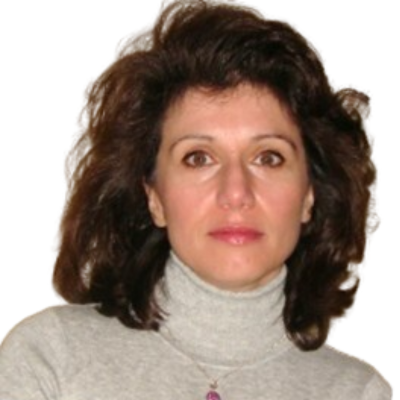
 Angeliki Alexiou, Professor, Department of Digital Systems, University of Piraeus
Angeliki Alexiou, Professor, Department of Digital Systems, University of Piraeus Angeliki Alexiou is a professor of Broadband Communications Systems at the department of Digital Systems, ICT School, University of Piraeus, Greece. She received the Diploma in Electrical and Computer Engineering from the National Technical University of Athens in 1994 and the PhD in Electrical Engineering from Imperial College of Science, Technology and Medicine, University of London in 2000.
Since May 2009 she has been a faculty member at the Department of Digital Systems, where she conducts research and teaches undergraduate and postgraduate courses in Broadband Communications and Advanced Wireless Technologies. Prior to this appointment she was with Bell Laboratories, Wireless Research, Lucent Technologies, (later Alcatel-Lucent, now NOKIA), in Swindon, UK, (January 1999 – April 2009).
Professor Alexiou is a co-recipient of Bell Labs President’s Gold Award in 2002 for contributions to Bell Labs Layered Space-Time (BLAST) project and the Central Bell Labs Teamwork Award in 2004 for role model teamwork and technical achievements in the IST FITNESS project. Professor Alexiou is the Chair of the Working Group on Radio Communication Technologies and of the Working Group on High Frequencies Radio Technologies of the Wireless World Research Forum. Her current research interests include radio interface for 6G systems, MIMO, THz wireless communication technologies, Reconfigurable Intelligent Surfaces, Joint Communications and Sensing Machine Learning for wireless systems. She is the project coordinator of the (H2020) TERRANOVA project and the technical manager of (H2020) ARIADNE project and (SNS JU) INSTINCT project.
Prof. Angeliki Alexiou
Professor, Department of Digital Systems, University of Piraeus
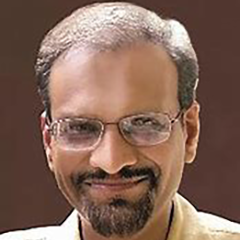
 Dr. Sudhir Dixit, Vice Chair for Americas, WWRF
Dr. Sudhir Dixit, Vice Chair for Americas, WWRF Sudhir Dixit is currently a Senior Fellow and Evangelist of Basic Internet at the Basic Internet Foundation in Norway and heads its San Francisco office. He has over 30 years of experience in computer networking and telecommunications, and related fields. From 2015 to 2017 he was the CEO and Co-Founder of a start-up, Skydoot, Inc, in the cloud-based and collaboration space. From December 2013 to April 2015, he was a Distinguished Chief Technologist and CTO of the Communications and Media Services for the Americas Region of Hewlett-Packard Enterprise Services in Palo Alto, CA, and prior to this he was the Director of Hewlett-Packard Labs India from September 2009. Prior to joining HP Labs Palo Alto, Dixit held a joint appointment with the Centre for Internet Excellence (CiE) and the Centre for Wireless Communications (CWC) at the University of Oulu, Finland. From 1996 to 2008, he held various positions with leading companies, such as with BlackBerry as Senior Director, with Nokia and Nokia Siemens Networks in the United States as Senior Research Manager, Nokia Research Fellow, Head of Nokia Research Centre (Boston), and Head of Network Technology (USA). From 1987 to 1996, he was at NYNEX Science and Technology and GTE Laboratories (both now Verizon Communications) as a Staff Director and Principal Research Scientist.
Dixit has 21 patents granted by the US PTO and has published over 200 papers and edited, co-edited, or authored eight books published by Wiley, Artech House and Springer. He is presently on the editorial boards of IEEE Spectrum Magazine, Cambridge University Press Wireless Series and Springer’s Wireless Personal Communications Journal and Central European Journal of Computer Science (CEJS). He is Chairman of the Working Group C on new directions in networking and communications at the Wireless World Research Forum (WWRF), where he is also a Board Member. From 2010 to 2012, he was an Adjunct Professor of Computer Science at the University of California, Davis, and, since 2010, he has been a Docent of Broadband Mobile Communications for Emerging Economies at the University of Oulu, Finland.
A Life Fellow of the IEEE, IET, and IETE, Dixit received a Ph.D. degree in electronic science and telecommunications from the University of Strathclyde, Glasgow, U.K. and an M.B.A. from the Florida Institute of Technology, Melbourne, Florida.
Dr. Sudhir Dixit
Vice Chair for Americas, WWRF
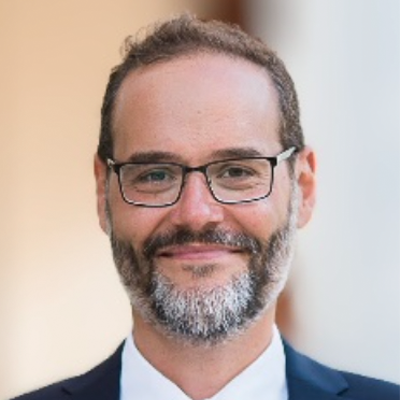
 Prof Christos Masouros, Dept. Electronic & Electrical Eng., University College London
Prof Christos Masouros, Dept. Electronic & Electrical Eng., University College London Communications and Radar systems: from Co-existence to Joint Transmission
Abstract: The integration of sensing and communication functionalities is seen as a key enabling technology for 6G networks to provide services beyond communications. In this talk I argue that it is a natural evolution of the two technologies, as it has obvious gains in energy-, hardware- and cost- efficiency through the use of dual-functional hardware. I further explain that their co-design also offers opportunities in flexible trade-offs and new synergies between sensing and communication. I discuss signalling strategies that enable information exchange together with target detection from a single transmission. I present some results from my team’s work in the area, that underline the benefits of the co-design in offering a graceful trade-off between the two functionalities. I conclude with some thoughts on research opportunities and the road ahead.
Christos Masouros (FIEEE, MIET) received the Diploma degree in Electrical and Computer Engineering from the University of Patras, Greece, in 2004, and MSc by research and PhD in Electrical and Electronic Engineering from the University of Manchester, UK in 2006 and 2009 respectively. In 2008 he was a research intern at Philips Research Labs, UK, working on the LTE standards. Between 2009-2010 he was a Research Associate in the University of Manchester and between 2010-2012 a Research Fellow in Queen’s University Belfast. In 2012 he joined University College London as a Lecturer. He has held a Royal Academy of Engineering Research Fellowship between 2011-2016.
Since 2019 he is a Full Professor of Signal Processing and Wireless Communications in the Information and Communication Engineering research group, Dept. Electrical and Electronic Engineering, and affiliated with the Institute for Communications and Connected Systems, University College London. His research interests lie in the field of wireless communications and signal processing with particular focus on Green Communications, Large Scale Antenna Systems, Integrated Sensing and Communications, interference mitigation techniques for MIMO and multicarrier communications. Between 2018-22 he was the Project Coordinator of the €4.2m EUH2020 ITN project PAINLESS, involving 12 EU partner universities and industries, towards energy-autonomous networks. Between 2024-28 he will be the Scientific Coordinator of the €2.7m EU H2020 DN project ISLANDS, involving 19 EU partner universities and industries, towards next generation vehicular networks. He is a Fellow of the IEEE, a Fellow of the Asia-Pacific Artificial Intelligence Association (AAIA), and was the recipient of the 2023 IEEE ComSoc Stephen O. Rice Prize, co-recipient of the 2021 IEEE SPS Young Author Best Paper Award and the recipient of the Best Paper Awards in the IEEE GlobeCom 2015 and IEEE WCNC 2019 conferences. He is an IEEE ComSoc Distinguished lecturer 2024-2025, has been recognised as an Exemplary Editor for the IEEE Communications Letters, and as an Exemplary Reviewer for the IEEE Transactions on Communications. He is an Editor for IEEE Transactions on Wireless Communications, the IEEE Open Journal of Signal Processing, and Editor-at-Large for IEEE Open Journal of the Communications Society. He has been an Editor for IEEE Transactions on Communications, IEEE Communications Letters, and a Guest Editor for a number of IEEE Journal on Selected Topics in Signal Processing and IEEE Journal on Selected Areas in Communications issues. He is a founding member and Vice-Chair of the IEEE Emerging Technology Initiative on Integrated Sensing and Communications (SAC), Vice Chair of the IEEE Wireless Communications Technical Committee SpecialInterest Group on ISAC, and Chair of the IEEE Green Communications & Computing Technical Committee, Special Interest Group on Green ISAC. He is a member of the IEEE Standards Association Working Group on ISAC performance metrics, and a founding member of the ETSI ISG on ISAC. He is the TPC chair for the IEEE ICC 2024 Selected Areas in Communications (SAC) Track on ISAC, and Chair of the “Integrated Imaging and Communications” stream in IEEE CISA 2024 .
Prof Christos Masouros
Dept. Electronic & Electrical Eng., University College London
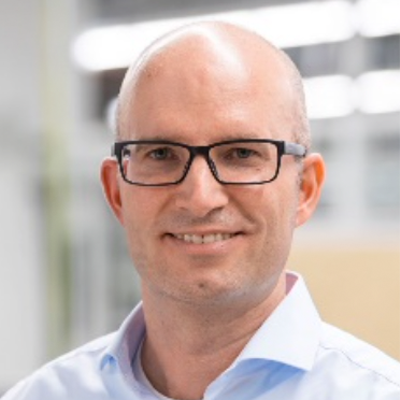
 Dr. Andreas Mueller, Project Director 6G, Robert Bosch GmbH
Dr. Andreas Mueller, Project Director 6G, Robert Bosch GmbH Integrated Sensing and Communication – The Killer Feature of 6G?
Abstract: Integrated sensing and communication (ISAC) hasreceived a lot of research attention in recent years and is often considered as one of the key new capabilities of mobile networks on the way towards 6G. This talk will explore the potential of ISAC in more detail, looking also at related technologies, such as reconfigurable intelligent surfaces (RIS), sub-THz spectrum or digital twinning and AI/ML. This will primarily be done from the perspective of different vertical industries, including the automotive and industrial sectors.
Dr. Andreas Mueller is a renowned expert at the forefront of connectivity research and 5G/6G innovation. As the leader of Bosch’s strategic 6G activities across diverse business units and sites, he spearheads holistic transformative endeavors aligned with business imperatives. With his profound expertise in communication technologies for the IoT, Andreas also serves as the Chief Expert in this field. Moreover, he has held the position of General Chair of 5G-ACIA, the globally leading organization driving and shaping Industrial 5G, since its establishment in 2018. Andreas’ pivotal contributions also include coordinating and advancing Bosch’s Industrial 5G undertakings over the last couple of years, focusing on key areas such as private networks, Open RAN, AI/ML, and edge computing. Equipped with a robust background in telecommunications and vertical industry applications, Andreas is uniquely positioned to drive the transformative 5G/6G-enabled revolution across various sectors.
Dr. Andreas Mueller
Project Director 6G, Robert Bosch GmbH
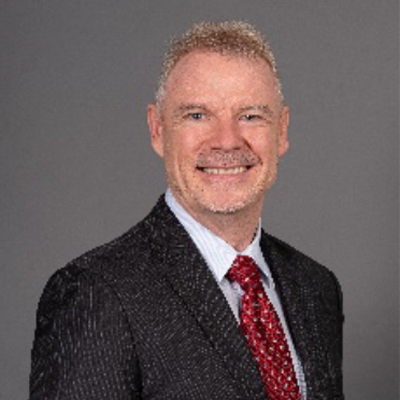
 Dr. Richard Stirling-Gallacher (ETSI ISG ISAC – Vice Chair)
Dr. Richard Stirling-Gallacher (ETSI ISG ISAC – Vice Chair) Overview of the ETSI Industry Specification Group (ISG) on ISAC
Abstract: The mission, scope and motivation of the newly established ETSI ISG on ISAC will be presented. This will include an overview of the current work item directions and subsequent planned deliverables toward 6G standardization.
Richard A. Stirling-Gallacher (Member, IEEE) received the M.Eng. degree in electronic engineering from the University of Southampton, U.K., in 1990, and the Ph.D. degree from The University of Edinburgh, U.K., in 1997. From 1997 to 2012, he was a Principal Researcher with Sony Deutschland GmbH, Stuttgart, Germany, where he led wireless system and algorithmic research for 3G, 4G, and millimeter-wave (mm-wave)-based communication systems. From 2012 to 2014, he was with Samsung Research America, Dallas, TX, USA, where he led research and pre-standardization for mm-wave and massive multi in multi out (MIMO) for 5G NR. He joined Huawei Technologies Inc., San Diego, CA, USA, in 2014, and subsequently in 2017, transferred to the Munich Research Center, Huawei Technologies Duesseldorf GmbH, Munich, Germany, as a Research Expert/Team Leader. He currently holds more than 125 granted U.S. patents and serves as vice chair for the ETSI ISG on ISAC. His current interests include ISAC, positioning, massive MIMO, and V2X for 6G communication systems.
Dr. Richard Stirling-Gallacher
ETSI ISG ISAC – Vice Chair

 Robert Elschner, Fraunhofer Heinrich Hertz Institute
Robert Elschner, Fraunhofer Heinrich Hertz Institute Wideband Integrated Sensing and Communication
Abstract: Wideband systems at high carrier frequencies in mmW or sub-THz regime potentially offer larger wireless capacities and higher-resolution environment sensing than lower frequency bands. However, the challenges from channel and transceiver perspective also increase, requiring a careful design of waveforms and digital signal processing (DSP) techniques at the transmitter and receiver for integrated sensing and communication (ISAC). In this talk, we will review channel and hardware impairments in wideband communication systems and discuss the implications for the ISAC waveform choices, impairment compensation strategies and the DSP implementation complexity.
Dr. Robert Elschner is a project manager and senior researcher in the department “Photonic Networks and Systems” at the Fraunhofer Heinrich Hertz institute in Berlin, Germany. He joined Fraunhofer HHI in 2010 after receiving his Ph.D. from Technical University of Berlin. His research interests include digital coherent transmission technology for high-speed fiber-optical and THz-wireless systems, in particular the design of DSP algorithms and their real-time implementation on FPGAs and ASICs. He has (co-)authored a book chapter and 120+ scientific journal and conference papers and served in several technical program committees of scientific conferences, e.g. OFC, IWMTS, GLOBECOM.
Dr. Robert Elschner
Fraunhofer Heinrich Hertz Institute
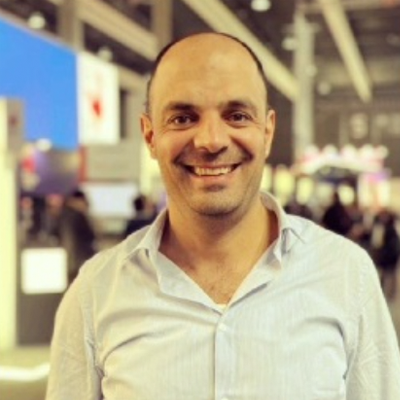
 Youssef Nasser, 5G/6G Business Line Director, Greenerwave
Youssef Nasser, 5G/6G Business Line Director, Greenerwave Reconfigurable Intelligent Surfaces and Dynamic Metasurfaces Antennas (DMA): Two Technology Enablers for Beyond 5G
Abstract: Reconfigurable Intelligent Surfaces, also known as intelligent reflecting surfaces or software-defined metasurfaces, are artificially engineered structures composed of a large number of tiny passive elements. These elements can be electronically controlled to manipulate the electromagnetic waves passing through them. RIS can effectively shape and control the propagation of wireless signals, enabling improved signal quality, enhanced coverage, and increased network capacity.
Dynamic Metasurfaces Antennas (DMA), on the other hand, leverage holography principles to create complex electromagnetic wavefronts. By manipulating the phase and amplitude of the radiated signals, holographic antennas can generate highly focused beams with unprecedented control and precision.
In this talk, we will present Greenerwave Technology that allow to enable enhanced wireless connectivity, improved user experiences, and innovative services. We will particularly address how the RIS and DMA will be utilized in different scenarios, including sensing and communications. The talk will also discuss the design, the use-cases and the integration of these technologies that embrace novel business models, partnerships.
Youssef Nasser obtained his executive MBA from the prestigious ESCP Business School in Paris, in 2022, and his PhD in wireless communications in 2006 from National Polytechnic Institute of Grenoble. He is currently the Director of 5G/6G Business Unit with Greenerwave, a French startup developing reconfigurable intelligent surfaces, smart and holographic antennas. Youssef is a Senior Executive with over twenty years’ experience in the Telecom business, shared between academia and industry including major industrial groups. His motivation and passion for technology have led him into the entrepreneurship world through a startup on spectrum management. Along his career, he has successfully led major R&D and industrial projects in the telecom industry including but not limited to 4G, 5G, DVB. Some of these projects have received gold and silver awards from the European Commission for their achievements. He has deployed several technological solutions in telecom sector and actively contributed to telecom standards. He has chaired industry associations and technology development conferences. Youssef Nasserpublished over 130 articles in internationally renowned journals and conferences. His areas of interest are mobile communications systems, spectrum management, telecom strategies.
Dr. Youssef Nasser
5G/6G Business Line Director, Greenerwave
The convergence of 6G, AI and ML, and IoT with advanced sensors, radars, and LIDARs offers great potential for the evolution of connected and autonomous vehicles (CAVs). 6G has the potential to offer increased performance an order of magnitude more than 5G. 6G promises to offer peak rates of 1 Tbps or more, 0.1 ms or less latency, and ten times more energy efficiency than 5G. CAVs can benefit by exploiting the features of 6G to provide mission-critical services, and ensure reliable communication for safety-critical applications. CAVs will be able to share real-time data about road conditions, traffic hazards, traffic congestion, and many other impediments.As 6G can facilitate the integration of terrestrial and satellite networks, CAVs can benefit by having seamless radio coverage across urban, rural, and remote areas.
AI/ML can positively impact CAVs by optimizing network performance, finding alternate routes during traffic congestion, and facilitating the implementation of advanced services with enhanced security. CAVs may utilize AI/ML to harness terra bytes of traffic data collected by sensors to optimize network performance, offer advanced services such as high-speed platooning of vehicles, and location-based services. Moreover, by utilizing edge computing and harnessing the power of 6G, CAVs may employ AI/ML to process the vast amount of data collected by the sensors and assess radio channel quality, enhance the received signal quality in an interference-rich environment including multipath propagation, estimate local traffic environment in real-time, and take decisions in real-time to improve safety and efficiency. AI/ML can also help CAVs improve the safety of pedestrians by employing edge computing and real-time decision-making as well as by exploiting the potential of virtual reality (VR) and hybrid reality (XR). Pervasive AI facilitates the implementation of AI/ML at all levels of the protocol state – the radio layer, the physical layer, the network layer, and the application layer. Generative AI may advance the creation of novel and innovative CAV applications.
Increasing synergy between 6G, AI/ML, and IoT will likely alter the landscape and evolution of CAVs, paving the way for CAVs with connected intelligence.
This workshop will explore several topics of current interest to researchers and industry personnel.
AGENDA:
1. AI-Driven Security of Connected and Autonomous Vehicles in Challenged Settings: B5G and at the dawn of 6G – Dr. Burak Kantarci, Professor, University of Ottawa, Ottawa, Canada.
2. Challenges and solutions for Vulnerable Roadside Users (VRU) safety – Prof. Dr.-Ing. Klaus David, University of Kassel, Germany, david@uni-kassel.de
3. Automated Driver Assistance Systems (ADAS) For Indian Road Conditions – Dr. Abhishek Mukhopadyay, Manager, Product Devlopment, Ashok Leyland.
4. Enhancing V2X Communications with UAV-mounted Reconfigurable Intelligent Surfaces – Salim Janji, Doctoral Researcher, Poznan University of Technology, Poland.
5. Computation Offloading and Resource Allocation in Vehicular Edge Computing Environment – S. Veena, RV University.
6. How Will Quantum Computing Impact Connected Vehicles and Cyber Security? – Ravi Puvvala, Center for Automotive Research
7. Advanced Driving and Cooperation on the Roads – Dr. Johannes Springer, Director Genera, 5G Automotive Association (5GAA), Germany
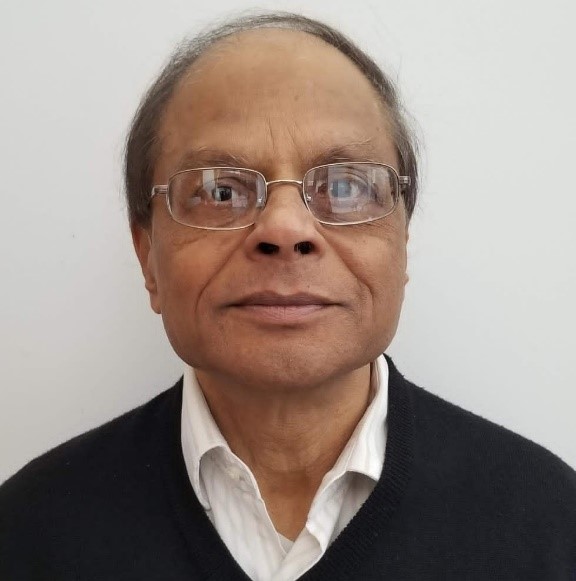
 Dr. Seshadri Mohan, UA Little Rock, Little Rock, AR 72204
Dr. Seshadri Mohan, UA Little Rock, Little Rock, AR 72204 Dr. Seshadri Mohan is currently a professor in School of Engineering Engineering Technology at University of Arkansas at Little Rock, where, from August 2004 to June 2013, he served as the Chair of the Department of Systems Engineering. Prior to the current position he served as the Chief Technology Officer (CTO) and Acting CEO of IP SerVoniX, where he consulted for several telecommunication firms and venture firms, and served as the CTO of Telsima (formerly known as Kinera). Besides these positions, his industry experience spans a decade at New Jersey-based Telcordia (formerly Bellcore) and Bell Laboratories. Prior to joining Telcordia, he was an associate professor at Clarkson and Wayne State Universities. He has authored/coauthored over 150 publications in the form of books, patents, and papers in refereed journals and conference proceedings with citations to his publications in excess of 6670. He is the inventor of 15 inventions with US and international patents. He has co-authored the textbook Source and Channel Coding: An Algorithmic Approach. He has also served as a Guest Editor for several Special issues of IEEE Network, IEEE Communications Magazine, ACM MONET and Wireless Personal Communications. In April 2011, he was awarded the 2010 IEEE Region 5 Outstanding Engineering Educator Award. He received the best paper award for the paper “A Multi-Path Routing Scheme for GMPLS-Controlled WDM Networks,” presented at the 4th IEEE Advanced Networks and Telecommunications Systems conference. He is a co-founder of the startup IntelliNexus, LLC. He holds a Ph.D. degree in electrical and computer engineering from McMaster University, Canada, the Master’s degree in electrical engineering from the Indian Institute of Technology, Kanpur, India, and the Bachelor’s degree in Electronics and Telecommunications from the University of Madras, India.Dr. Seshadri Mohan is currently a professor in School of Engineering Engineering Technology at University of Arkansas at Little Rock, where, from August 2004 to June 2013, he served as the Chair of the Department of Systems Engineering. Prior to the current position he served as the Chief Technology Officer (CTO) and Acting CEO of IP SerVoniX, where he consulted for several telecommunication firms and venture firms, and served as the CTO of Telsima (formerly known as Kinera). Besides these positions, his industry experience spans a decade at New Jersey-based Telcordia (formerly Bellcore) and Bell Laboratories. Prior to joining Telcordia, he was an associate professor at Clarkson and Wayne State Universities. He has authored/coauthored over 150 publications in the form of books, patents, and papers in refereed journals and conference proceedings with citations to his publications in excess of 6670. He is the inventor of 15 inventions with US and international patents. He has co-authored the textbook Source and Channel Coding: An Algorithmic Approach. He has also served as a Guest Editor for several Special issues of IEEE Network, IEEE Communications Magazine, ACM MONET and Wireless Personal Communications. In April 2011, he was awarded the 2010 IEEE Region 5 Outstanding Engineering Educator Award. He received the best paper award for the paper “A Multi-Path Routing Scheme for GMPLS-Controlled WDM Networks,” presented at the 4th IEEE Advanced Networks and Telecommunications Systems conference. He is a co-founder of the startup IntelliNexus, LLC. He holds a Ph.D. degree in electrical and computer engineering from McMaster University, Canada, the Master’s degree in electrical engineering from the Indian Institute of Technology, Kanpur, India, and the Bachelor’s degree in Electronics and Telecommunications from the University of Madras, India.
Dr. Seshadri Mohan
Professor, School of Engineering and Engineering Technology, UA Little Rock, AR 72204, USA

 Dr. Burak Kantarci, Professor, University of Ottawa, Ottawa, Canada.
Dr. Burak Kantarci, Professor, University of Ottawa, Ottawa, Canada. Dr. Burak Kantarci, is a Full Professor and the Founding Director of the Smart Connected Vehicles Innovation Centre (SCVIC) and Next Generation Communications and Computing Networks (NEXTCON) Research Lab at uOttawa. He holds a Ph.D. degree in computer engineering and is the author/co-author of 250+ publications in established journals and conferences, and 15 book chapters. Continuously listed among the top-cited scientists in telecommunications and networking based on the data reported by Stanford University since 2020, and since 2021, based on data collected from Microsoft Academic Graph, research.com has listed Dr. Kantarci among Canada’s top computer scientists. Dr. Kantarci holds an Exemplary Editor Award from IEEE Communications Surveys and Tutorials (2021), and multiple best paper awards from various conferences, most recently from IEEE Globecom2021, Wireless World Research Forum 2022, and IEEE ICC2023, IEEE VCC2023. He is a recipient of the Minister’s Award of Excellence from Ontario Ministry of Colleges and Universities (2021). He is the recipient of 2023 Technical Achievement Award of IEEE ComSocCommunications Software Technical Committee. He was a Distinguished Speaker of the Association of Computing Machinery (ACM) in 2019-2021. Currently he is a Distinguished Lecturer of the IEEE Communications Society and IEEE Systems Council. He has been a keynote/invited speaker or panelist in 40 events. In 2019-2020, Dr. Kantarci chaired the Communications Systems Integration and Modeling Technical Committee of the Institute of Electrical and Electronics Engineers (IEEE). He has been a general chair, program chair or track chair in 30+ international conferences. He is an Editor of the IEEE Communications Surveys and Tutorials, IEEE Internet of Things Journal, an Associate Editor for IEEE Networking Letters, and an Associate Editor for Elsevier Vehicular Communications.
Dr. Burak Kantarci
Professor, University of Ottawa, Canada
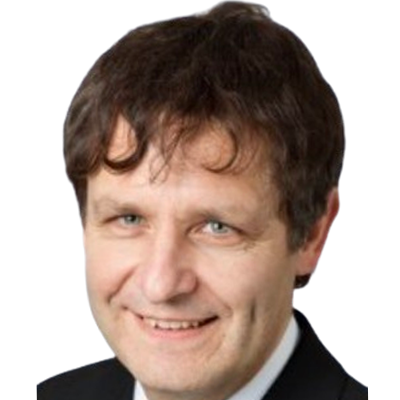
 Prof. Dr. Klaus David, University of Kassel, Germany
Prof. Dr. Klaus David, University of Kassel, Germany Dr. Klaus David (david@uni-kassel.de) is a full university professor and head of communication technology at Kassel University, Germany. His research interests include mobile networks, applications, and context awareness, and AI. He has 12 years of industrial experience in major companies like HP, Bell Northern Research, IMEC, T-Mobile (as Head of Group and UMTS project leader) and IHP (as Head of Department), with in total five years of international experience in the UK, Belgium, USA, and Japan. He has published over 200 scientific articles, including 3books, and has registered over 10 patents. He is active in IEEE (Editor in Chief IEEE VT Magazine 2015 – 2018, BoG 2015 – 2017 IEEE VT), WWRF (Wireless World Research Forum) as publication manager and elected SB Member and he is involved in many conferences, such as IST Future Network & Mobile Summit 2012 Berlin as TPC chair or 2013, 14, 15,16 and 18 in IEEE PerCom as TPC member, or General Chair IEEE PerCom 2021. Also, he is a regular technology and strategy consultant to industry as well as co-founder of two start-up companies.
Prof. Dr. Klaus David
University of Kassel, Germany
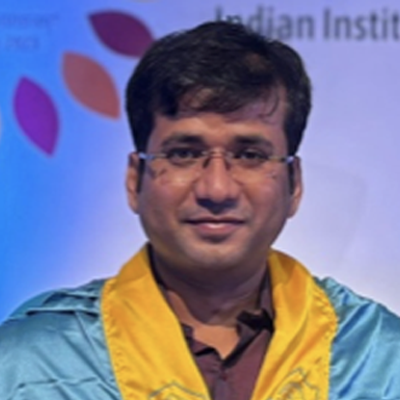
 Dr. Abhishek Mukhopadyay, Manager, Product Devlopment, Ashok Leyland
Dr. Abhishek Mukhopadyay, Manager, Product Devlopment, Ashok Leyland Dr. Abhishek Mukhopadyay
Manager, Product Development, Ashok Leyland
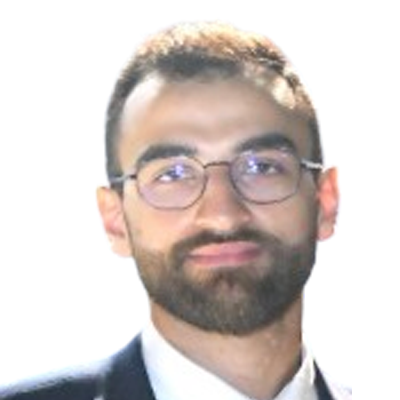
 Salim Janji, Doctoral Researcher, Poznan University of Technology, Poland.
Salim Janji, Doctoral Researcher, Poznan University of Technology, Poland. Salim Janji is a Ph.D. student at PUT focusing on UAV base stations. He received his M.Sc. in 2020 in electronics and telecommunications at the Insitute of Radiocommunications where he is currently employed as a teaching assistant, and his B.Sc. in electrical engineering from the University of Balamand in 2017. Besides UAV base stations, his interests include reinforcement learning in wireless networks, reconfigurable intelligent surfaces (RIS), and O-RAN.
Salim Janji
Doctoral Researcher, Poznan University of Technology, Poland.
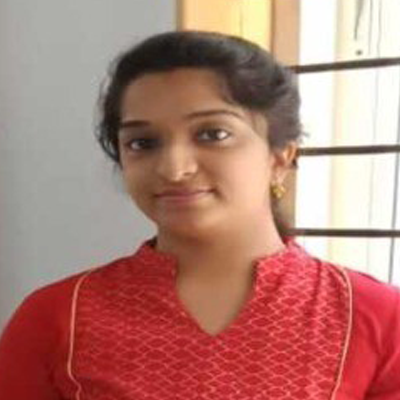
 Prof. Veena S., Assistant Professor, RV University
Prof. Veena S., Assistant Professor, RV University Prof. Veena S. is a dedicated academician and researcher, currently serving as Assistant Professor at RV University. Her journey in academia spans over six years, during which she has passionately shared her knowledge and expertise with students at PES University, DSCE.
Before venturing into academia, Prof. Veena gained valuable experience in the aerospace domain. She served as a Junior Engineer at the esteemed National Aerospace Laboratories, contributing to Micro Aerial Vehicle projects.
Currently, she is pursuing her Ph.D. in the field of Vehicular Edge Computing, with a primary focus on computation offloading. She received a M.tech in Electronics from Ambedkar Institute of Technology.
She has over 10 international research publications in peer-reviewed journals and conferences. In addition to her research and teaching, she has also conducted hand-on sessions for IoT courses, covering a wide array of platforms, including Arduino, Raspberry Pi, and STM32 processors, which equipped students with the skills needed to navigate the complex world of IoT.
Prof. Veena S.
Assistant Professor, RV University
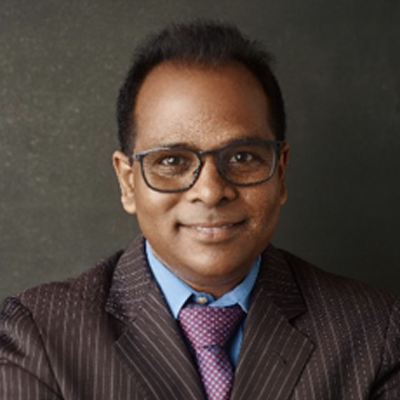
 Ravi Puvvala, Center for Automotive Research
Ravi Puvvala, Center for Automotive Research quantum computing.
Ravi’s industry influence extends through his prior role at Harman International, where he was instrumental in launching a division for cybersecurity products in connected vehicles. As Vice President of Strategic Partnerships, he spearheaded initiatives in V2X and cybersecurity, developing a platform to reduce the time to resolve cybersecurity breaches in vehicles. His leadership extended to serving on the board of directors of Auto-ISAC, facilitating critical information sharing and analysis amongst automotive OEMs and suppliers.
As the Founder and CEO of Savari, Ravi was pivotal in the company’s journey to become a leading provider of V2X technology in 5G solutions for OEM auto manufacturers and smart cities. His guidance saw the company through its R&D phase, collaborating with the Crash Avoidance Metrics Partnership (CAMP), and securing innovative grants from the USDOT. In the product deployment phase, Ravi’s strategic direction expanded the company’s reach to over 100 employees across the US, Germany, India, and China. His efforts in securing contracts with global Auto OEMs and deploying roadside units across various state DOTs culminated in the successful sale of Savari to Harman.
Prior to Savari, Ravi founded Arada Systems, where he served as CEO and CTO, establishing the company as a leader in connected car technologies before its acquisition by Lear. His tenure in Silicon Valley included work with various startups and a significant role in pioneering connected automotive technologies.
Ravi has actively worked with researchers at University Transportation Centers, US DOT Volpe, Crash Avoidance Metrics Partnership, and other automotive organizations, sharing his expertise and fostering advancements in the field. He has been a prominent speaker on topics like 5G, cybersecurity, AI, quantum computing, and V2X at industry conferences, including 5GAA, Auto-ISAC, and Connected Car, among others.
Ravi holds a Master’s and Bachelor’s degree in Computer Science from Arizona State University and Bangalore University respectively. Ravi’s educational foundation has supported his career marked by innovation, leadership, and a commitment to transforming the automotive landscape.
Ravi Puvvala
Center for Automotive Research
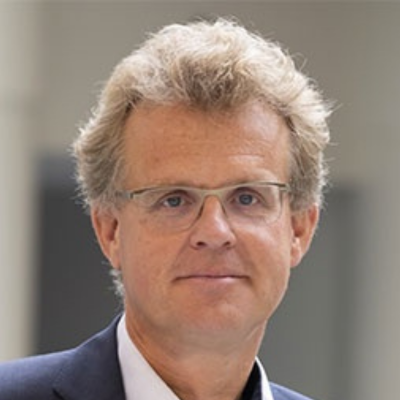
 Dr. Johannes Springer, Director General, 5G Automotive Association (5GAA), Germany
Dr. Johannes Springer, Director General, 5G Automotive Association (5GAA), Germany Dr. Johannes Springer
Director Genera, 5G Automotive Association (5GAA), Germany
© Copyright FOGES NV. All rights reserved | Privacy Policy | Terms and Conditions | Cookies Policy | Booking Terms and Conditions
Registered in Belgium | Registered Office: Route de Lennik 451, 1070 Brussels, Belgium | Email: team@fe-ofc.com